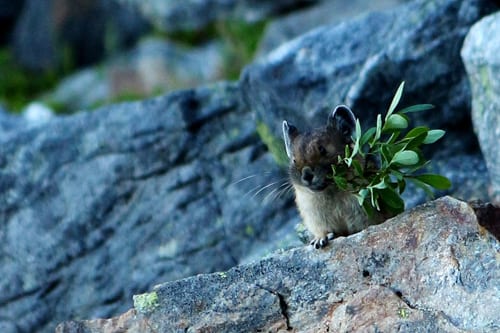Since 1999, Seattle City Light’s Wildlife Research Grants Program (WRP) has funded more than 50 projects and distributed over $2 million in research grants to non-profit conservation organizations, universities and resource management agencies to study the wildlife that inhabits the North Cascades ecoregion.
The WRP is an element of City Light’s federal license for operating the Skagit River Hydroelectric Project in the North Cascades region, which requires the utility to collaborate with resource and land management agencies to select and fund original wildlife research projects.
Last week, WRP announced the recipients of four new research grants aimed at gaining a better understanding of wildlife and ecosystems in the North Cascades. The new grant recipients include the following:
Conservation Northwest – Testing a cloud-based computer application for agencies and organizations in U.S. and Canada to assess changes in habitat conditions for wolverines, which are susceptible to climate change.
Woodland Park Zoo and Washington State University – Developing a monitoring framework for wolverines, Canada lynx, and other carnivores in the North Cascades to aid in developing effective management strategies in the face of climate change.
Western Washington University – Assessment of survival and reproduction of mountain goats that were translocated into the North Cascades to bolster depleted populations.
Eastern Washington University – Evaluation of the role of beavers in reducing wildfire severity in riparian communities of the Methow River watershed where increased fire activity is expected as the climate changes.

the effects of climate change. (Photo credit: J.D. Anderson)
These new grants will join the list of previously funded projects that have helped provide data crucial for agencies to make informed management decisions for rare or economically and tribally important species.
Several of the research projects funded through WRP have led to published articles in peer-reviewed professional scientific journals and conference presentations. While the grants may not always fully fund a project idea, they still support the research of lasting environmental impacts. Most notably: the effects of climate change on the region.
“We take great pride that these grants help lay the groundwork for vital research to take shape while also supporting undergraduate or graduate college students pursuing environmental degrees who will be our next generation of environmental stewards,” explains Ron Tressler, Wildlife Biologist at City Light. “The flora and fauna of the North Cascades ecosystem are a barometer for how the species will thrive during the next century with the impending effects of climate change, so these research projects are critical.”
The WRP is one of many programs City Light champions that studies and rehabilitates the region near its facilities across the state. For decades, City Light has led the way in acquiring lands along the Skagit River Watershed to protect vital salmon spawning habitats. Last year, City Light provided funding to research and forecast the recession patterns of glaciers in the North Cascades.
Recently, City Light, in partnership with the Mountains to Sound Greenway, Seattle Public Utilities and the Northwest Natural Resource Group, received a $140,000 grant for an innovative pilot project that will replant portions of logged land now owned by City Light to grow a new forest that could be more resilient to climate change. This pilot project will inform future climate-adapted restoration practices for lands owned by City Light, Seattle Public Utilities and other owners in the region. The long-term goal of the reforestation effort is to establish a diverse forest that will be adapted to the climate of the mid to late 21st century. For City Light’s Chief Environmental Officer Lynn Best, these projects are vital to better understand how the ecological landscape in the Pacific Northwest will gravely affect both the utility’s customers and its energy production.
“Climate change is the greatest environmental challenge we face today. I am proud that City Light is doing its part to address climate change and protect the Earth.”
To learn more about City Light’s Wildlife Research Project and for a list of previous grant-funded projects, visit